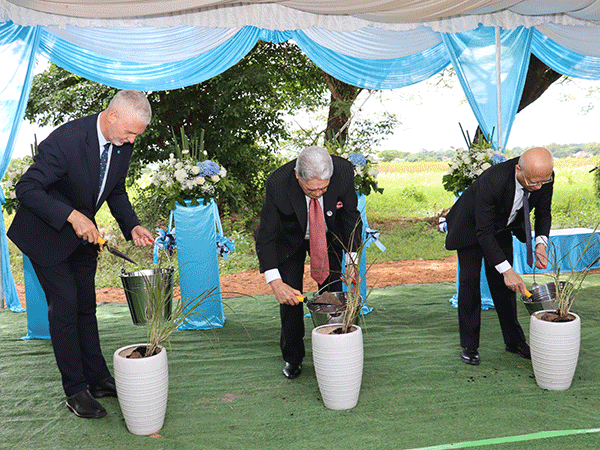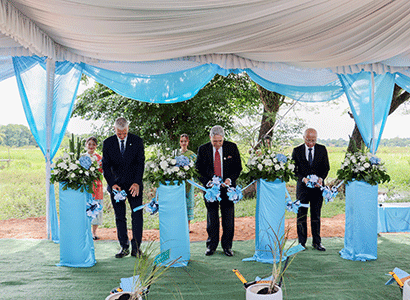Ministry of Public Works and Transport, New Zealand’s Ministry of Foreign Affairs, GGGI launch urban wetland restoration programme in Vientiane
The Minister of Public Works and Transport, Mr Ngampasong Muongmany, Deputy Prime Minister and Minister of Foreign Affairs of the Government of New Zealand, Rt. Hon. Winston Peters, and Director-General of the Global Green Growth Institute (GGGI), Dr Frank Rijsberman, officially launched the ‘Nature-Based Solutions for Urban Adaptation (NATURA)’ programme at the Nong Loup Ian wetland and marsh in Sikhottabong district, Vientiane.
 |
| Mr Ngampasong Muongmany, Rt. Hon. Winston Peters, and Dr Frank Rijsberman plant saplings to mark the official launch of the the project. |
The launch ceremony took place on the edge of the wetland on July 26, and was also attended by district authorities and village chiefs from surrounding areas.
Speaking at the event, Mr Ngampasong said “The NATURA programme aligns with the Ministry of Public Works and Transport’s goal to create urban environments that are resilient to climate change. It also supports the ministry’s stated mission to “Develop the public works and transport sector as a leading, specific priority, highly effective, modern, safe, climate resilient, integral, and sustainable sector”.
“Adopting nature-based solutions in urban development is a suitable approach for Laos’ socio-economic needs. It is cost-effective for maintenance, promotes sustainability, supports the ecosystem, and helps absorb carbon and heat in cities,” he added.
At the same ceremony, Rt. Hon. Winston Peters expressed New Zealand’s satisfaction in contributing to a project that aims to improve the resilience of communities in Laos that are vulnerable to flooding.
“New Zealand is pleased to support this project to strengthen the resilience of flood prone communities in Laos,” he said.
“We are committed to working with Laos and our other ASEAN partners across a range of development, economic, security and environmental initiatives, and this project is another demonstration of that.”
Over the years, through Vientiane’s expansion and population increase, many of its wetlands and waterways including the biodiversity within them have been lost. With climate change also driving increases in the intensity of monsoon storms and rainfall, flood events are becoming more frequent, affecting thousands of people.
 |
| Mr Ngampasong Muongmany (right), Rt. Hon. Winston Peters (centre), and Dr Frank Rijsberman cut a ribbon to launch the NATURA initiative in Sikhottabong district. |
“Every year 30-40 percent of our village is flooded during the monsoon, sometimes up to roof level. We welcome this programme which will benefit the whole community,” one of the village chiefs participating in the programme said.
The Director-General of GGGI, Dr Frank Rijsberman, said “Nature-based solutions provide a cost-effective approach to reducing community-level urban flood risk and vulnerability by restoring ecosystems and waterways for improved flood management.”
“Urban wetland restoration can create opportunities for enhancing the local – green – economy, create livelihoods and green jobs, and function as areas for recreation and education.”
The NATURA programme aims to reduce the impact of flooding on vulnerable urban communities, contributing to safe, resilient and inclusive sustainable development by building and engaging local people in green jobs and preserving the biodiversity of the Nong Loup Ian wetland.
The programme will support the integration of biodiversity values into national and local planning while also contributing to habitat restoration.
To implement the program GGGI will work in partnership with the Department of Housing and Urban Planning (DHUP) of MPWT and will engage with the district and village authorities in the Nong Loup Ian area to ensure that the project resolves flooding, and benefit impacted communities the most.
The NATURA programme is proposed to last two phases of five years each, The programme will undertake extensive flood resilience improvements through nature-based solutions such as marsh restoration around the Nong Loup Ian wetland (Phase I) and the Nam Ping river and wetland (Phase II).
Across these two phases, the programme will directly benefit 140,000 people.
Phase I of the programme has received US$6.5 million in financial support from New Zealand’s Ministry of Foreign Affairs and Trade.
By Advertorial Desk
(Latest Update August 2, 2024)
|



